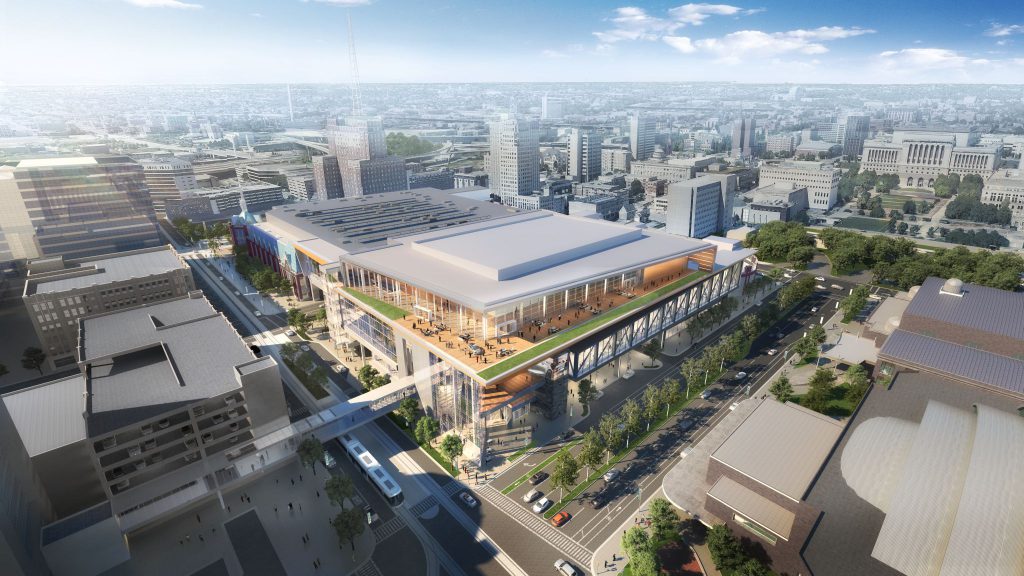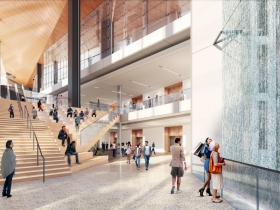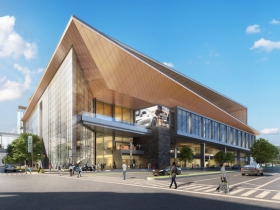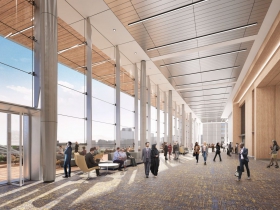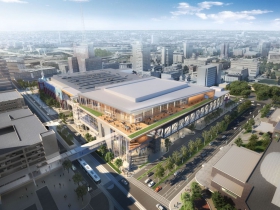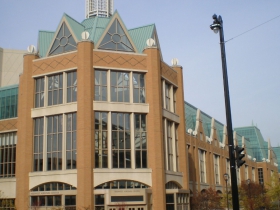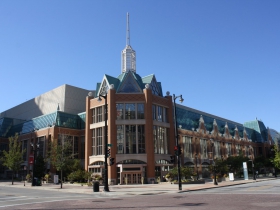Wisconsin Center Faces 50% Revenue Cut
But CEO Marty Brooks still pushing to expand center, issue bonds during pandemic.
The Wisconsin Center District is still considering authorizing an expansion of the convention center, even as district staff brief board members on their work to avoid defaulting on existing loans.
The district, which is funded by a combination of food and beverage, rental car and hotel taxes as well as rental fees, is forecasting no tax revenue from April through June and a reduction of $22 million in tax collections, a more-than 50-percent cut, for the year.
The district had projected an income of $583,000 after depreciation in its 2020 fiscal year, but because of that $22 million loss, “We are down on our net income relative to the budget by about $21 million,” said district senior vice president and Chief Financial Officer Steve Marsh. His assessment was offered during a briefing of district board’s Finance & Personnel Committee on Monday morning.
“Our revenue projects for the rest of the year aren’t very significant,” said Marsh. But one thing they’re still budgeting for is “several million dollars” in rental income and reimbursable expenses from the Democratic National Convention.
Steps are being taken to lower operating costs in response to declining revenues. “We’re actively managing and controlling those elements of the business that we have some amount of control over,” said Marsh. Salaried staff have taken a 20 percent pay cut, an ice sheet in the UW-Panther Milwaukee Arena has been removed now that the Milwaukee Admirals season has been suspended and the heat in various buildings has been turned down. The Miller High Life Theater is completely closed. The district is looking to move capital projects from being paid for with income to using debt payments.
“I am confident we are going to get through this,” said Marsh. He said the impact of the COVID-19 pandemic would be most strongly felt by the district at the back end of the year when events start occurring again. A cash flow projection shows the district’s restricted revenue account used to repay debt would have a $6 million negative balance starting on September 1st if no action is taken.
Two resolutions will come before the 17-member board at its April 2nd meeting. Option A would authorize up to $690 million in debt, with up to $525 million in debt used to finance the $420 proposed expansion, $15 million to fund capital projects in the short term and $150 million in refinancing existing debt. Option B would allow only for the refinancing and short-term capital borrowing. Refinancing debt, originally envisioned before the pandemic took hold in the United States, is intended to reduce debt payments in the short term to create more free cash flow.
Under each scenario the county hotel room tax would be increased from 2.5 percent to 3 percent and a 0.5 percent food and beverage sales tax would be extended past its 2033 projected sunset. “Just so everyone’s clear about that we are raising taxes in the middle of a recession, possibly a depression,” said Bauman during the meeting, the only time the issue was broached.
Bauman was critical of District CEO Marty Brooks‘ Friday memo to the board that said a revenue-sharing deal between the Common Council and WCD had been reached that each side “could accept.” He said, “this so-called agreement has not presented to the Common Council in any shape or form.” Brooks has been negotiating by phone with Council President Ashanti Hamilton and representatives of Mayor Tom Barrett.
“No agreement has been reached. These are discussions about terms and conditions that I believe are reasonable for the district to be engaged and recommend to the board for their support,” said Brooks. He said a revised deal had been sent to the city Monday morning. “I would not take this information to a public meeting if I did not believe and didn’t know these discussions had occurred.” The district needs the city’s certification of revenue estimates in order to obtain a moral obligation from the state, and without that obligation the borrowing costs associated with the project are expected to grow by $40 million to $50 million. The council rescinded the certification last week to force Brooks to the bargaining table.
Brooks asked the finance committee if he was being “tone deaf” in proceeding with the expansion? “Yes, I am very concerned about it,” said Bauman.
“I support your actions. Keep going. We have to get this done,” said Mark Flaherty, managing partner at hotel developer Jackson Streets Holdings.
During the meeting of the district board’s Governance Committee that followed the finance committee, Brooks did not ask for verbal feedback and instead asked for it to be emailed. “This is something that could serve as a significant economic stimulus package,” said Brooks. Both meetings were held via phone and streamed on YouTube.
During the governance meeting, Hamilton asked what the worst-case scenario was for issuing debt. “The doomsday scenario was probably two weeks ago in terms of what’s going on in the bond market, what’s going on in the stock market,” said Bill Mack, a project consultant with Morgan Stanley. “There wasn’t an ability to do any deals whatsoever.” He said interest rates had rebounded since then to be closer to pre-pandemic levels. “There is a path for at least addressing parts of the finance plan.” He said his firm took five bond deals to market last week and anticipated more.
The full 17-member district board will meet via phone on Thursday, April 2nd.
Barrett’s office did not respond to a request for comment on the negotiations by the time of publication.
Army Studies Wisconsin Center, State Fair for Pandemic
Brooks said the Army Corps of Engineers would tour the Wisconsin Center campus Monday morning after visiting Wisconsin State Fair Park as part of an evaluation of the facilities’ suitability for use in responding to the pandemic. “I assure you that are we doing anything we can to make our facility available to any local, county, state or federal agencies that can help us all,” said Brooks.
Renderings
Current Building
If you think stories like this are important, become a member of Urban Milwaukee and help support real, independent journalism. Plus you get some cool added benefits.
More about the Coronavirus Pandemic
- Governors Tony Evers, JB Pritzker, Tim Walz, and Gretchen Whitmer Issue a Joint Statement Concerning Reports that Donald Trump Gave Russian Dictator Putin American COVID-19 Supplies - Gov. Tony Evers - Oct 11th, 2024
- MHD Release: Milwaukee Health Department Launches COVID-19 Wastewater Testing Dashboard - City of Milwaukee Health Department - Jan 23rd, 2024
- Milwaukee County Announces New Policies Related to COVID-19 Pandemic - David Crowley - May 9th, 2023
- DHS Details End of Emergency COVID-19 Response - Wisconsin Department of Health Services - Apr 26th, 2023
- Milwaukee Health Department Announces Upcoming Changes to COVID-19 Services - City of Milwaukee Health Department - Mar 17th, 2023
- Fitzgerald Applauds Passage of COVID-19 Origin Act - U.S. Rep. Scott Fitzgerald - Mar 10th, 2023
- DHS Expands Free COVID-19 Testing Program - Wisconsin Department of Health Services - Feb 10th, 2023
- MKE County: COVID-19 Hospitalizations Rising - Graham Kilmer - Jan 16th, 2023
- Not Enough Getting Bivalent Booster Shots, State Health Officials Warn - Gaby Vinick - Dec 26th, 2022
- Nearly All Wisconsinites Age 6 Months and Older Now Eligible for Updated COVID-19 Vaccine - Wisconsin Department of Health Services - Dec 15th, 2022
Read more about Coronavirus Pandemic here
More about the Wisconsin Center expansion
- Council Could Kill Revised Baird Center Revenue-Sharing Agreement - Jeramey Jannene - May 21st, 2025
- $456 Million Baird Center Opens With Big Promises, Vision - Jeramey Jannene - May 16th, 2024
- Public Can Tour Baird Center Expansion - Jeramey Jannene - May 7th, 2024
- See Inside The Massive Baird Center Expansion - Jeramey Jannene - Apr 18th, 2024
- Baird Center Selects Artists, Works To Be Displayed - Sophie Bolich - Jan 22nd, 2024
- City Hall: Council Wants New Deal, Says Convention Center ‘Outsmarted’ City - Jeramey Jannene - Oct 16th, 2023
- ‘Polka Time!’ Escalator Gets Celebratory Sendoff - Sophie Bolich - Aug 18th, 2023
- Eyes on Milwaukee: Baird Center Reaches Highest Point - Jeramey Jannene - May 11th, 2023
- Wisconsin Center Makes Deal to Save Literary Artwork - Bruce Murphy - May 1st, 2023
- Wisconsin Center Pauses Art Removal - Jeramey Jannene - Apr 14th, 2023
Read more about Wisconsin Center expansion here
Political Contributions Tracker
Displaying political contributions between people mentioned in this story. Learn more.
- August 18, 2016 - Ashanti Hamilton received $250 from Mark Flaherty
- November 24, 2015 - Tom Barrett received $500 from Mark Flaherty
- November 17, 2015 - Tom Barrett received $18 from Mark Flaherty
- November 17, 2015 - Tom Barrett received $1,000 from Mark Flaherty
- September 4, 2014 - Robert Bauman received $250 from Mark Flaherty
Eyes on Milwaukee
-
Church, Cupid Partner On Affordable Housing
 Dec 4th, 2023 by Jeramey Jannene
Dec 4th, 2023 by Jeramey Jannene
-
Downtown Building Sells For Nearly Twice Its Assessed Value
 Nov 12th, 2023 by Jeramey Jannene
Nov 12th, 2023 by Jeramey Jannene
-
Immigration Office Moving To 310W Building
 Oct 25th, 2023 by Jeramey Jannene
Oct 25th, 2023 by Jeramey Jannene


